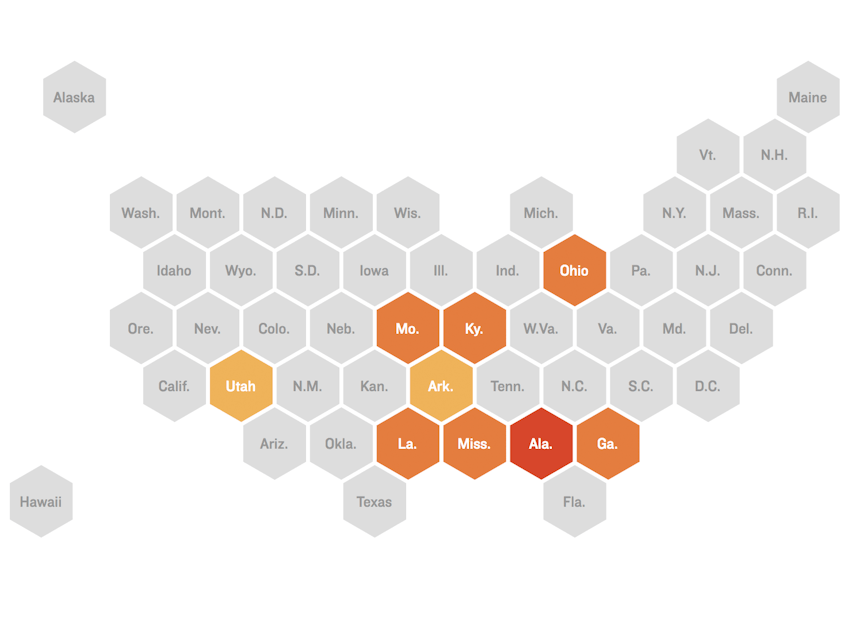Early Abortion Bans: Which States Have Passed Them?

This year has brought an unprecedented wave of new state laws that only allow abortions to be performed early in pregnancy — if at all.
Most of the new laws — known as early abortion bans — explicitly outlaw abortion when performed after a certain point early in pregnancy. The laws vary, with some forbidding abortion after six weeks of pregnancy, and some after eight weeks. Alabama's law is the most extreme: It aims to outlaw abortion at any point, except if the woman's health is at serious risk. So far in 2019, nine U.S. states have passed laws of this type, and more states are considering similar legislation.
Don't see the graphic above? Click here.
None of the laws passed this year are actually in effect, either because they have a future enactment date, or judges have put them on hold in response to lawsuits, or both.
These new bans are a direct challenge to the precedent set by the 1973 Supreme Court ruling Roe v. Wade, which affirmed that a woman has a right to seek an abortion up until the point that the fetus could be "viable" outside of the uterus. Viability must be determined on an individual basis, but is generally between 24 and 28 weeks of pregnancy.
Sponsored
"We want to stop abortion of unborn children. And the only way we can do that is to go back and revisit the Roe decision," Eric Johnston, the president of the Alabama Pro-Life Coalition, told NPR's Ari Shapiro. Johnston helped write the Alabama law that outlaws almost all abortions.
"This law is, in effect, a vehicle to do that," he added.
A few states already have existing laws that outlaw abortion earlier in pregnancy than the standard sent by Roe, banning the procedure as early as 18 or 20 weeks. When challenged, bans on abortion at this stage of pregnancy have consistently been struck down in court, according to the Guttmacher Institute. But not all of those laws have been challenged in court, so they remain on the books. There is no state law currently in effect that bans abortion before 20 weeks.
Two states, New York and Vermont, have moved in the other direction. Both states passed laws this year that affirm the legal right to an abortion in each state, even if the Supreme Court overturns Roe v. Wade.
These early abortion bans differ from another common type of state regulation known as a TRAP law — for Targeted Regulation of Abortion Providers. TRAP laws place particular restrictions on the doctors or health clinics that provide abortions, and the Supreme Court has allowed some of these laws to go into effect, while striking down others.
Sponsored
Don't see the graphic above? Click here.
Here's some details on the newest bans, by state.
*Important note: Supporters of reproductive rights have filed multiple lawsuits against this type of law. None of these early abortion bans are currently in effect or being enforced.
Alabama – No abortion after 0 weeks. No exceptions for rape or incest. Allows exceptions if the woman's life is threatened.
Arkansas — No abortion after 18 weeks. Allows exceptions for rape, incest or medical emergencies.
Sponsored
Georgia – No abortion after 6 weeks. Allows exceptions for rape or incest if the woman files a police report. Also includes exceptions if the woman's life is endangered, if the pregnancy is deemed "medically futile," and in cases of rape or incest if the woman files a police report.
Kentucky – No abortion after 6 weeks. No exceptions for rape or incest. Allows exceptions if the woman's life is endangered.
Louisiana – No abortion after 6 weeks. No exceptions for rape or incest. Allows exceptions if the woman's life is endangered or if the pregnancy is deemed "medically futile."
Mississippi – No abortion after 6 weeks. No exceptions for rape or incest. Allows exceptions if the woman's life is endangered.
Missouri – No abortion after 8 weeks. No exceptions for rape or incest. Allows exceptions if the woman's life is endangered.
Sponsored
Ohio – No abortion after 6 weeks. No exceptions for rape or incest. Allows exceptions if the woman's life is endangered.
Utah – No abortion after 18 weeks. No exceptions for rape or incest. Allows exceptions if the woman's life is endangered.
NPR's Carrie Feibel, Sarah McCammon and Carmel Wroth contributed to this report. [Copyright 2019 NPR]



